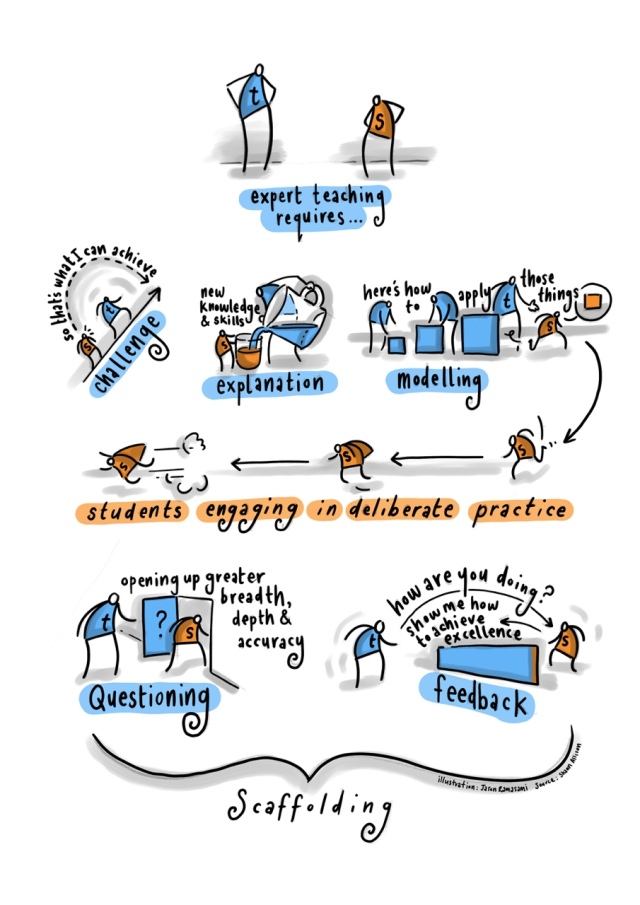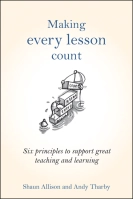Last week I gave a talk to our new staff about teaching. The night before, I asked the good people of twitter for their input:
It caused a bit of a discussion! So I thought I would elaborate on some of my thoughts. Some of which have changed quite a lot over the past few years – thanks to engagement with some great colleagues, tweeters and bloggers!
Learning should be fun
Now don’t get me wrong – I love teaching and think that young people are brilliant. We have a nice time in lessons and I think I have a good rapport with the students I teach. But fun is a nice by-product of my teaching – it’s never the focus of my planning. That’s about what I want them to know, understand and do. David Didau illustrates this brilliantly with an example of a lesson that he once observed. It was on the Irish Potato Famine, but the students spent the first half of the lesson having ‘fun’, searching the classroom for potatoes (hidden by the teacher). I’m sure they did have fun…but you’d question whether they would ever have to answer a GCSE question on finding potatoes in a classroom. If my memory serves me correctly, I think David’s co-observer graded the lesson as outstanding – which is even more worrying!
Learning always happens during a lesson
Learning happens over a long period of time and involves repetition, getting it wrong and trying it again, gradually perfecting it through deliberate practice. So this is unlikely to take place in an hour. What we should be focusing on during a lesson is their performance in terms of particular aspects these processes – that will eventually support them embedding new knowledge and skills e.g. how have they performed with explaining their ideas as well as describing them in that 6 mark question?
So, rather than asking students “What have you learnt?” at the end of the lesson, ask them “What did you struggle with today?” – then use this to plan your next lesson.
Learning styles are important
I get the impression that this is still lingering! So, I’ll let Daniel Willingham explain:
Now, please let that be an end to it!
Students can learn well independently
As teachers, we have the knowledge that students need in order to learn and develop their own knowledge base and skills. We also know how to explain it well, put it into context, add depth and breadth to it etc. So, I think we’re pretty important in terms of learning. Yes they can pick things up through books and online – but will they get that richness? No.
Developing independence is different though.
Following teacher explanation and modelling of, say for example writing a historical analysis of a source, students should then practise doing it for themselves – with us scaffolding their work with questioning and feedback. As we do this, students will be able to refine their work and be able to do this with increasing confidence and competence. Our scaffolding will be reduced and they will be able to do this task with growing independence. But they wouldn’t have been able to do this independently – without the explanation, modelling, questioning and feedback of the teacher.
Group work is always highly effective
It can be if it is really well planned and monitored. Unfortunately though, it often ends up like this:
So think carefully. What’s the purpose of them working in a group? If they are doing something like a group critique of a piece of work, where everybody is contributing to the critique – great. If it’s just for the sake of it…maybe think again!
We all have limits to our intelligence
The idea of the ‘Growth Mindset’ suggests that through hard work, effort, resilience and deliberate practice, we can all improve our intelligence/ performance. Robert Rosenthal explores this with the ‘Pygmalion Effect’:
So, it appears that one of the key things to limit student performance, is our expectations of them.
Differentiated learning objectives are useful
Learning objectives that start with ‘All, most, some’ are still hanging around from the ‘National Strategy’ days. I think these are very unhelpful and go against the idea of fostering a growth mindset. I think they stifle aspirations of what students can achieve and give them an easy way out – ‘I’ll just focus on the ‘All’ objective and not bother about the rest’.
Much better to have a single, challenging objective for all and support all students to aspire to get there:
Match the teaching to the ability
No! In the same spirit as the diagram above, if we do this we are never going to promote struggle – struggle requires thinking and when we have to think about things, we are more likely to remember them and so learning takes place. So, if what we are teaching them is too easy, there will be limited learning – this is the comfort zone. Similarly if it’s too hard, this will result in cognitive overload, panic and likewise, limited learning. So the trick is to get the challenge right, so they are out of the comfort zone and in the struggle zone, but not in the panic zone – then you’ll get learning.
Along these lines, all too often all we hear about is ‘top end challenge’. This is annoying – we should always be thinking about ‘challenge for all’.
Copying learning objectives is useful
It isn’t – it’s a waste of lesson time. Nothing wrong with having them, discussing them, using them as an opportunity to elicit prior knowledge etc etc. But copying them out doesn’t really serve a huge purpose.
Lessons should have fast pace
Many teachers have been criticised for not having enough ‘pace’ to their lessons. This is odd – as learning takes time. Deliberate practice is essential – and shouldn’t be rushed. Obviously spending a half term, on something that should take a week is a problem in terms of curriculum coverage (?), but there’s nothing wrong with going slow – in fact it’s quite necessary.
Teacher talk should be limited
There are courses you can go on, to help you talk less – and they cost about £400! This is another odd one. Teachers need to explain complex ideas, question students about their understanding, give them feedback, unpick misconceptions, challenge them to develop their thinking, let them know what they are getting right etc etc. All of this require talking. Please don’t stop talking….it’s rather important!
Don’t smile ’til Christmas
And finally this one was from Vic Goddard. Nothing wrong with smiling – we’re all human (students and teachers), all living in a rather odd little social institution called a school – so be nice to each other! That doesn’t mean you don’t have high expectations in terms of behaviour, insist on absolute focus during lessons, be firm and consistent with sanctions etc etc – but there’s nothing wrong with smiling.
So, great teaching is not rocket science, it’s about this…..















Some great points. Just wondered what sort of books don’t give context, breadth, depth and ‘richness’.
Reblogged this on The Echo Chamber.
Pingback: ORRsome blog posts from the week that was. Week 36 | high heels and high notes
Pingback: Edssential » Mythbusting…
Pingback: The Benefits of Regular Retrieval Practice | Class Teaching
Pingback: Education Panorama (October ’14) by @TeacherToolkit | @TeacherToolkit
Pingback: Sutton Trust 2014 coverage. | @mrocallaghan_edu
Pingback: 2014 – blogging best bits | Class Teaching
Pingback: Great Teaching – Great Teachers | Class Teaching
Pingback: 8 Catch-Up Pedagogies Every Teacher Should Know, by @Powley_R | UKEdChat - Supporting the Education Community
Pingback: Life without lesson observation grades | Class Teaching
Pingback: 8 Catch-Up Pedagogies Every Teacher Should Know | LOOK OUT FOR LEARNING
This is the most sense I have ever read about teaching. I’m constantly being told off for talking too much, not having enough pace in my lessons and for teaching rather than “facilitating learning”, but my students consistently do better than others so I don’t get in any real trouble for it. I will never come to terms with how much complete bull is so widely considered gospel in teaching and how readily so many teachers abandon common sense and how blind they are to what their kids are actually doing it achieving if it goes against what the literary equivalent of advice from some bloke down the pub.